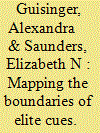| Srl | Item |
| 1 |
ID:
155499


|
|
|
|
|
| Summary/Abstract |
When and how do elite messages shape mass opinion on international issues? Do informational or partisan components of elite cues dominate? Recent survey experiments offer conflicting insights. We argue that issue context matters, and that the single-issue nature of most survey experiments masks systematic variation in how elite cues affect attitudes across international issues. These effects depend on the baseline distribution of mass opinion on the issues themselves. Two characteristics of underlying opinion prove crucial: first, the share of those not aligned with expert opinion, and second, the degree of partisan polarization. Where polarization is limited, information effects should dominate. Where issues are polarized, information intake should be limited by partisan attribution. We test these hypotheses using nine survey experiments across a range of issues, including the rise of China, climate change, international institutions, and the use of force. At one extreme, all messages—even those endorsed by generic or opposition experts—can shift opinion; at the other, only partisan-attributed messages matter. Our findings are important not only for understanding public opinion about international issues but also for those interested in mobilizing opinion in a democratic setting.
|
|
|
|
|
|
|
|
|
|
|
|
|
|
|
|
| 2 |
ID:
149366


|
|
|
|
|
| Summary/Abstract |
We argue that widely accepted elitist and “clientelist” models of immigration policy in the United States unduly minimize popular pressure on policy-making. These models portray majority opinion in ways that fail to recognize divergence between the public’s abstract goals for immigration policy and its support for the concrete policy changes needed to achieve them. As a result, they obscure many important instances in which immigration policy accords with public preferences despite counter-pressure from elites and organized lobbies. We demonstrate this point by identifying and explaining gaps between generalized attitudes and beliefs about specific policies in the domains of both legal and illegal immigration, showing that status quo legal admissions policies are not starkly at odds with majority preferences and that, contrary to interpretations of most commercial polling on the topic, majorities reject specific aspects of legalization programs that organized lobbies insist on as components of a “grand bargain” to overhaul an immigration system widely viewed as “broken.” Appreciating the nuance in mass opinion toward immigration policy helps explain policy stagnation that confounds elitist models and suggests that forging ahead with immigration reform will require persuading the public and not only successful bargaining among elites and interest groups.
|
|
|
|
|
|
|
|
|
|
|
|
|
|
|
|